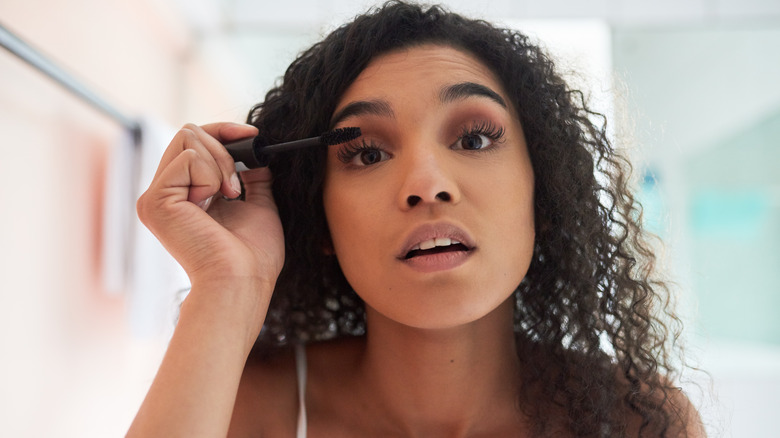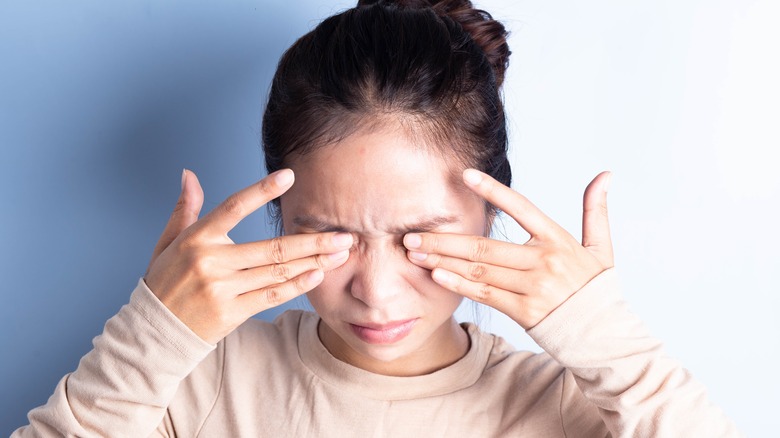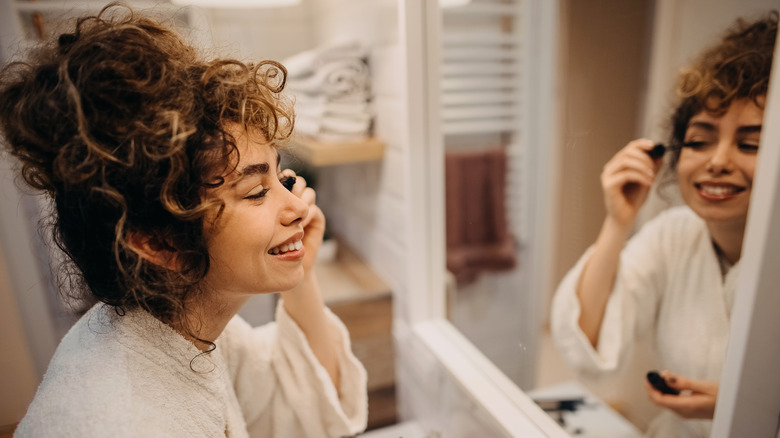Waterproof Mascara May Not Be Good For Your Eye Health. Here's What To Know
Despite our efforts to explore alternate ways to make our makeup last longer, waterproof mascaras are still making their way onto our lashes nearly a century after their invention. And can you blame us? With all that we have going on in our lives, it's convenient to have a product that we know is guaranteed to last all day and never smudge or transfer.
But unfortunately, while we may love that this makes our makeup weather and cry-proof, it's not exactly the best thing for our eye health. "The eyeballs and eyelid skin are so sensitive and really prone to damage," ophthalmologist Dr. Ashley Brissette explained to The Zoe Report. Applying any form of makeup near these areas comes with the risk of triggering inflammation and irritation, be it eyeliner, eyeshadow, or mascara. However, unlike regular mascara, or tubing mascaras and fiber mascaras, waterproof mascaras contain additional ingredients that could make them riskier to use.
Some waterproof mascara contains harmful chemicals
A big reason why waterproof mascara is concerning is due to its ingredient list. Unlike regular mascara, waterproof formulas contain certain chemicals to make them long-lasting and resistant to water. Speaking to SELF, dermatologist Dr. Dendy Engelman, shared, "The ingredients that are used to cause the formula to be waterproof can have the effect of drying out lashes, which can lead to them falling out," she explained to SELF.
Some examples of those ingredients include the compounds isododecane and cyclopentasiloxane, which are used to help make the product smooth and apply easily on the lashes. Dimethicone copolyol, a type of silicone additive found in hair products, is often included as an emulsifier, but it can be drying. What's more, according to a 2021 study of 231 cosmetic products conducted by Notre Dame University, more than three-fourths of waterproof mascaras contain chemicals called polyfluoroalkyl substances (PFAs). Although PFAs are present in most everyday products, some scientists believe they may have carcinogenic effects (though more research is needed to know what those effects are.)
"[PFA]s are used basically to impart a water-resistance or a long-lasting effect, and that's why we know that some of it's intentional. If you look at regular mascara and you look at waterproof mascara, guess which ones have all the fluorine in it? It's the waterproof one." The good news is, thanks in part to the clean beauty movement, there are plenty of mascara products on the market that don't contain these chemicals.
How to safely apply waterproof mascara
Since waterproof mascara is intended to stay on all day, the formula becomes sticky and difficult to remove (which inevitably leads to tugging and ripping lashes off). Effectively applying waterproof mascara can help prevent some of this damage, and that starts with preparation. Before applying mascara, use a conditioning lash primer to hydrate lashes before applying mascara. This will not only give your lashes a moisturizing base, but also put a barrier between them and the mascara product that will make it easier to remove later in the day. Some popular lash conditioners include Pacifica's Vegan Collagen Lash Serum Primer ($17), LashFood's Conditioning Collagen Lash Primer ($20), and DIME's Vegan Lash Primer ($34).
"More people tend to neglect removing waterproof mascara at the end of the night because it is more difficult to remove," she explained to SELF. Unfortunately, sleeping with makeup on, especially that close to the eye, comes with the risk of developing infections. This is why it's important to always make sure you're completely removing the product after each wear before you go to sleep. Use quality eye makeup removers and apply them to the lashes for 30 seconds before wiping to ensure it soaks up the product. Alternatively, apply a thick oil such as coconut oil or olive oil to a cotton swab and gently rub it against the lashes for removal.


